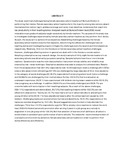| dc.description.abstract | The study examined challenges facing female secondary school teachers of Bumula Division in performing their duties. Female secondary school teachers form the majority among late comers, absent themselves from school, lag in syllabus coverage and rarely meet datelines, tendencies that result into low productivity in their teaching duties. Analyzed results at Bumula Division level(2008) reveal miserable mean grades of subjects taught exclusively by female teachers.
The purpose of the study was to investigate challenges experienced by female secondary school teachers as they perform their duties. As such the study sort to achieve three objectives. Establishing challenges faced by the female secondary school teachers was the first objective, determining the effects the challenges have on teaching duties and investigating ways to mitigate the challenges were the second and third objectives respectively.
Relatively, little is in the literature on female secondary school teachers challenges.
However, challenges affecting women in general are dealt with in the literature review section. Adopting a descriptive survey research design, the study's sample of thirty eight female teachers in six secondary schools was obtained by purposive sampling. Sampled schools have five or more female teachers. Questionnaire was the main data collection instrument whose validity and reliability was ensured by test -retest technique.
Descriptive statistics was used to analyze the collected data. Results from the analyses show that 34(1l.6%) respondents view 18-26 lessons per week a challenge,32(1l.OOIo) endure late adjournment ofmeetings,22(7.5%) are challenged by large class size of 50 or more students. In the category of social challenges,32( 26.2%) respondents find carrying school work home a challenge and 30(24.6%) are challenged by their marital status. Further 22(16.2%) find menstruation an unpleasant experience, 30(22.1) have experienced milk letdown during lesson sessions while 22(16.2%) view pregnancy as a challenge. In addition 36(34.3%) are financially challenged and 28(26.7%) are uncomfortable
with some topics in their teachings subjects.
As a result of the above challenges, 26(9.11%) respondents are demoralized, 20(7.0%) find teaching tiresome while 10(3.5%) are not effective in class control. Twenty six (15.7%) have had to arrive in school late due to attending to their young children while 30(18.1 %) have abandoned lessons after the embarrassment caused by milk letdown. Challenging topics are covered where hurried and sketchily by 16(15.2%) respondents or the topics are avoided altogether by 12(1l.4%). Several suggestions were fronted to help alleviate the challenges.
Thirty four (12.2%) respondents urge the TSC to employ more teachers to reduce the work load, 26(9.4%) floated automatic promotion after serving 3 years in a job group as a remedy to stagnation in one job group while 12(4.3%) felt that selection of leamers of all abilities to all school s would check on persistent poor performance of some schools. The researcher recommends provision of a conducive environment by schools to female secondary school teachers in order to perform
their duties effectively and efficiently. | en_US |

